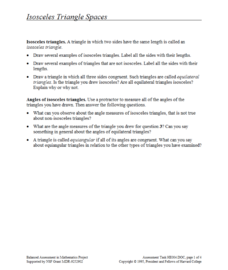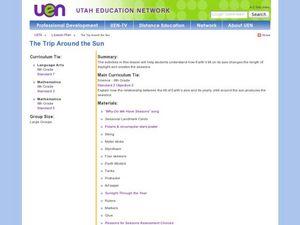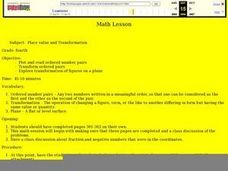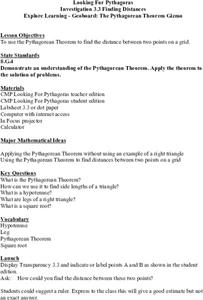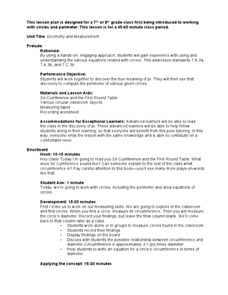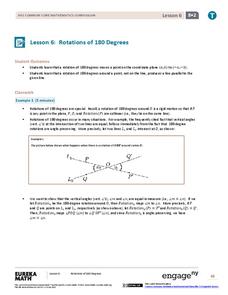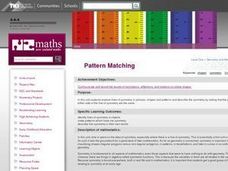Concord Consortium
Isosceles Triangle Spaces
How many different types of triangles can your class name? A discovery lesson guides learners through an exploration of the different triangle types and the relationships between their angles and sides. Using coordinate geometry,...
Curated OER
The Trip Around the Sun
Sixth graders investigate the relationship between the tilt of the Earth's axis and the seasons. In this earth science lesson, 6th graders sing the song "Why Do We Have Seasons" and use simulate the Earth's tilt by using their bodies.
Space Awareness
Valleys Deep and Mountains High
Sometimes the best view is from the farthest distance. Satellite imaging makes it possible to create altitude maps from far above the earth. A three-part activity has your young scientists play the role of the satellite and then use...
Curated OER
Worksheet 6 - Vector
In this vector worksheet, students draw simple pictures, identify the positions of the vectors, write equations to describe vector location. This two-page worksheet contains four multi-step problems.
Curated OER
Place Value and Transformation
Fourth graders have a class discussion about fraction and negative numbers that were in the coordinates. They plot and read ordered numbered pairs. They transform ordered pairs and explore transformation of figures on a plane.
Pennsylvania Department of Education
Tetrominoes and Translations
Young scholars explore geometry by participating in a pattern identification activity. In this tetrominoes lesson, students define the characteristics of congruent and symmetrical shapes. Young scholars practice translating shapes across...
Curated OER
Pythagorean Theorem
In this Pythagorean theorem worksheet, 9th graders solve and complete 8 different types of problems. First, they go to the given website and copy the picture shown. Then, students draw a right triangle using the straight line between the...
Curated OER
Geometry and Measurement
Students view a right triangle displayed by the teacher. Students measure legs and the interior angles of the triangle. They look for a pattern or relationship between the legs and angles. Students use pegboards and string to create more...
Charleston School District
3D Applications of the Pythagorean Theorem
How many right triangles can you find in a prism, cone, or pyramid? Using right triangles to find lengths in three-dimensional figures is the focus of the lesson. After working with the Pythagorean Theorem to find missing side...
EngageNY
Rotations of 180 Degrees
What happens when rotating an image 180 degrees? The sixth lesson in the series of 18 takes a look at this question. Learners discover the pattern associated with 180-degree rotations. They then use transparency paper to perform the...
Fall River Schools
Parabolas Are All Around Us
Moving parabolas off of graph paper and into the real world is the task at hand in this detailed poster project. First, learners perform a cumulative activity identifying many characteristics of an assigned quadratic equation. Next, they...
Virginia Department of Education
Graphing Linear Equations
Combine linear equations and a little creativity to produce a work of art. Math scholars create a design as they graph a list of linear equations. Their project results in a stained glass window pattern that they color.
Illustrative Mathematics
Why Does SSS Work?
While it may seem incredibly obvious to the geometry student that congruent sides make congruent triangles, the proving of this by definition actually takes a bit of work. This exercise steps the class through this kind of proof by...
American Museum of Natural History
Thinking in the Three Dimensions
Discover different dimensions with paper folding. Pupils first read about zero, one, two, and three dimensions, and then learn about the fourth dimension, time. They then use origami to create models of shapes in three dimensions and use...
Curated OER
Pixel Mosaic
Students discuss current knowledge of pixels. They listen as the teacher explains their importance in picture clarity. Students view the "Pixel Mosaic Animated Movie." Students receive pieces of pictures and matching tiles which...
Curated OER
A Christmas Project
Seventh graders publish a letter and spreadsheet using the computer. They build a three-dimesnsional object with construction paper and develop a Christmas object using coordinates on a graph. Students compose a response in their journals.
Curated OER
Where In the World Are We?
Fifth graders read postcards and find their locations on maps. They use the pictures and text on the postcards to write about imaginary vacations. They compute the mileage and compare it to TripMaker data.
Curated OER
Problem Posing Mathematics
Students work on multiplication problems. In this hands-on math lesson plan, students practice the concept of multiplication through manipulatives, arrays, pictures, and drawings. They discover other ways of learning multiplication...
Curated OER
Pattern Matching
First graders examine how to determine the lines of symmetry in pictures, shapes, and patterns by completing the lessons in this unit. They make patterns that show a line of symmetry and describe it using their own language.
Charleston School District
Constructing Dilations
Pupils multiply the vertical and horizontal distances from the center of dilation by the scale factor. The independent practice prompts the class to analyze the relationship between the image and pre-image. The lesson is...
Illustrative Mathematics
A Midpoint Miracle
Young geometers develop one of the fundamental properties of quadrilaterals (connecting side midpoints gives a parallelogram) in this short but thought-provoking exercise. Using a combination of hands-on techniques and abstract algebraic...
Balanced Assessment
Getting Closer
Flip the script! Reverse the situation and ask the class to find the function given asymptotes. The task requires class members to use their knowledge of functions and asymptotes to create functions that have a given asymptote or...
Balanced Assessment
Para-Ball-A
Analyze the flight of a thrown ball. Learners determine the maximum height of a thrown ball and the time it takes to hit the ground given its initial speed. They continue to review different scenarios with different maximums or...
Charleston School District
Identifying Series and Determining Congruence or Similarity
Learners consider a set of questions to determine a series of transformations that will move one figure to another. Once the series is determined, the pupil then determines whether the pre-image and image are either congruent...


